Today, Customer Relationship Management (CRM) systems have become an integral part of every organization's toolkit. They help businesses manage customer data, streamline processes, and improve customer interactions. While many businesses invest heavily in CRM solutions, there's a growing interest in free CRM options.
But what does "free CRM" really mean? Are open-source CRMs considered free? Are they truly cost-effective for businesses? In this article, we will explore the world of free CRM, shed light on the differences between open-source and free CRM, provide a list of CRM companies offering free plans, and offer recommendations to help businesses make informed choices.
What Is Meant by Free CRM?
Free CRM, in its essence, refers to Customer Relationship Management software that is provided to businesses without any upfront cost. These CRM solutions can be accessed and used by organizations at no charge, typically with certain limitations.
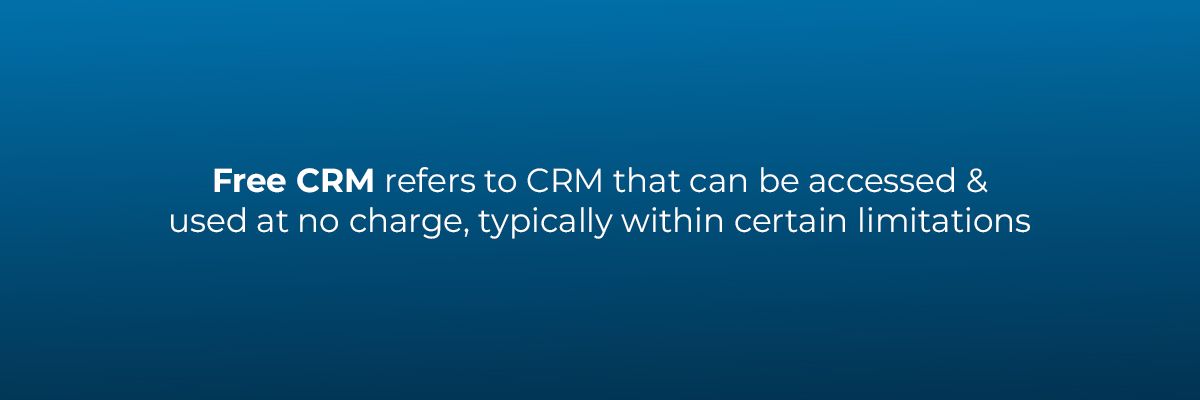
Free CRM and free trials provided by some CRM providers, however, are not the same. CRM suppliers typically offer free trials for a very brief period of time, typically between 7 and 30 days. Before signing up for the paid CRM, the buyer or subscriber can use the CRM firsthand and test its usability, business fit, and some functions through the free trial.
Although open-source CRMs are also accessible for free, free CRM and open-source CRM are not the same. Open-source CRMs are those for which the source code is accessible, allowing users to modify them as per requirement.
What can you expect from a free CRM?
Are CRM Solutions Provided for Free Really Free?
It's essential to recognize that while free CRM systems can be a great starting point for small businesses or startups with a budget limit, they may not provide all the features and scalability required as a business grows.
Free CRM options often come with the following limitations that a business needs to consider:
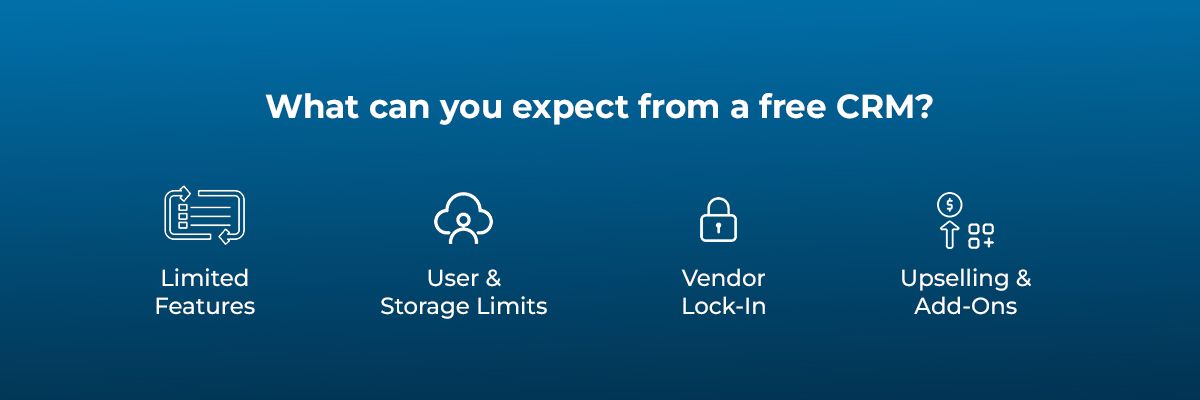
Limited Features
Free CRM plans typically offer a subset of features compared to their paid counterparts. Advanced features like marketing automation, custom reporting, and integrations may be restricted.
User and Storage Limits
Free CRM plans often limit the number of users and storage capacity, which can be constraining as a business grows.
Vendor Lock-in
Some free CRM solutions may make it challenging to migrate to another CRM system in the future, potentially resulting in data lock-in.
Upselling and Add-Ons
CRM providers offering free plans often aim to convert users into paying customers by promoting their premium plans and add-on services. This is generally observed in case open-source CRMs
List of Top CRM Companies That Provide CRM for Free
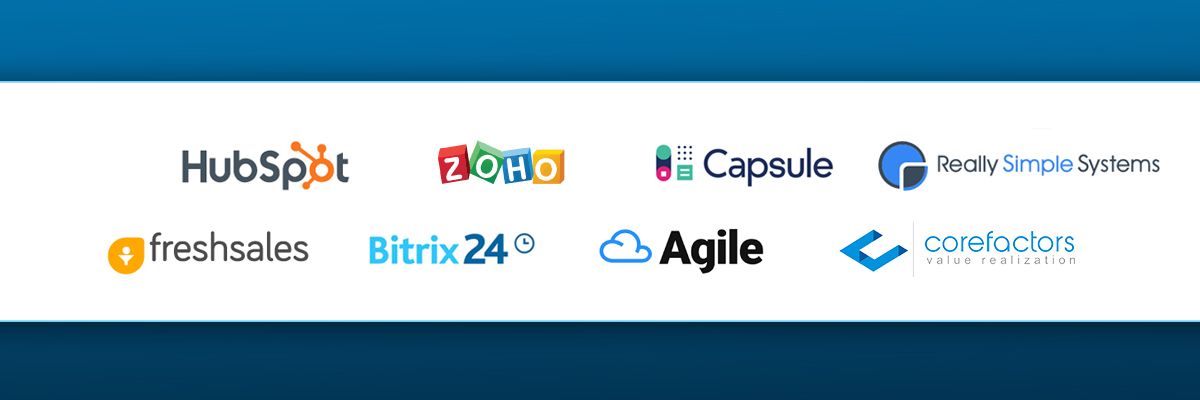
1. Corefactors
Corefactors offers 1 year of free access to Revops-enabling AI-powered CRM to startups under the Corefactors for Startups program. Corefactors AI CRM is a unified CRM platform for entire revenue-generating teams that includes sales, marketing, customer support, and customer success.
The solution automates operations and engagements across the customer lifecycle, breaks silos between teams, and empowers businesses to manage multiple departments, markets, and geographical locations efficiently and effectively.
2. HubSpot CRM
Hubspot offers a collection of free tools as part of its CRM platform. These tools include “lite” versions of certain features available in the paid product: Marketing Hub, Sales Hub, Service Hub, CMS Hub, Operations Hub, and Commerce Hub.
Many of the free tools like email marketing, blog, live chat, meeting scheduler, and so on, include Hubspot branding besides having limited capability. HubSpot’s free CRM functionality is 100% free, with no expiration date, for unlimited users, however, it is not suitable for streamlining operations due to limited capability.
3. Zoho CRM
Zoho offers a fully-featured free edition of its flagship CRM software for 3 users with no hidden charges or no time bondage. However, the free version lacks a mass emailing feature and offers very limited customizability and support. If you are starting a business, then this could be a good option.
4. Freshsales
Freshsales formerly known as Freshworks CRM offers its all-in-one CRM platform for free for 3 users. They also provide 24/5 support on email, phone, and chat to free users.
5. Bitrix24
Bitrix24 provides a CRM solution that’s free for up to 12 users, with a cap on data storage of 5 GB. Feature-wise, everything you need to manage sales is there, from pipeline management, lead management, sales tracking, sales automation, and more. However, the features have limited capability and they offer limited customization.
6. Capsule CRM
The Basic version of Capsule CRM is available for free for 2 users. The free plan is capped at 250 contacts, so you may find yourself suddenly hitting a glass ceiling and having to commit to a paid plan.
7. Agile CRM
Agile CRM provides a free version for up to 10 users. You can manage up to 1,000 contacts for free with basic sales and marketing automation.
8. Really Simple Systems
Really Simple Systems offers a free CRM plan designed for up to 2 users. It allows for unlimited contacts and up to 100 MBs of document storage. The free version includes many of the core features including sales automation and customer service.
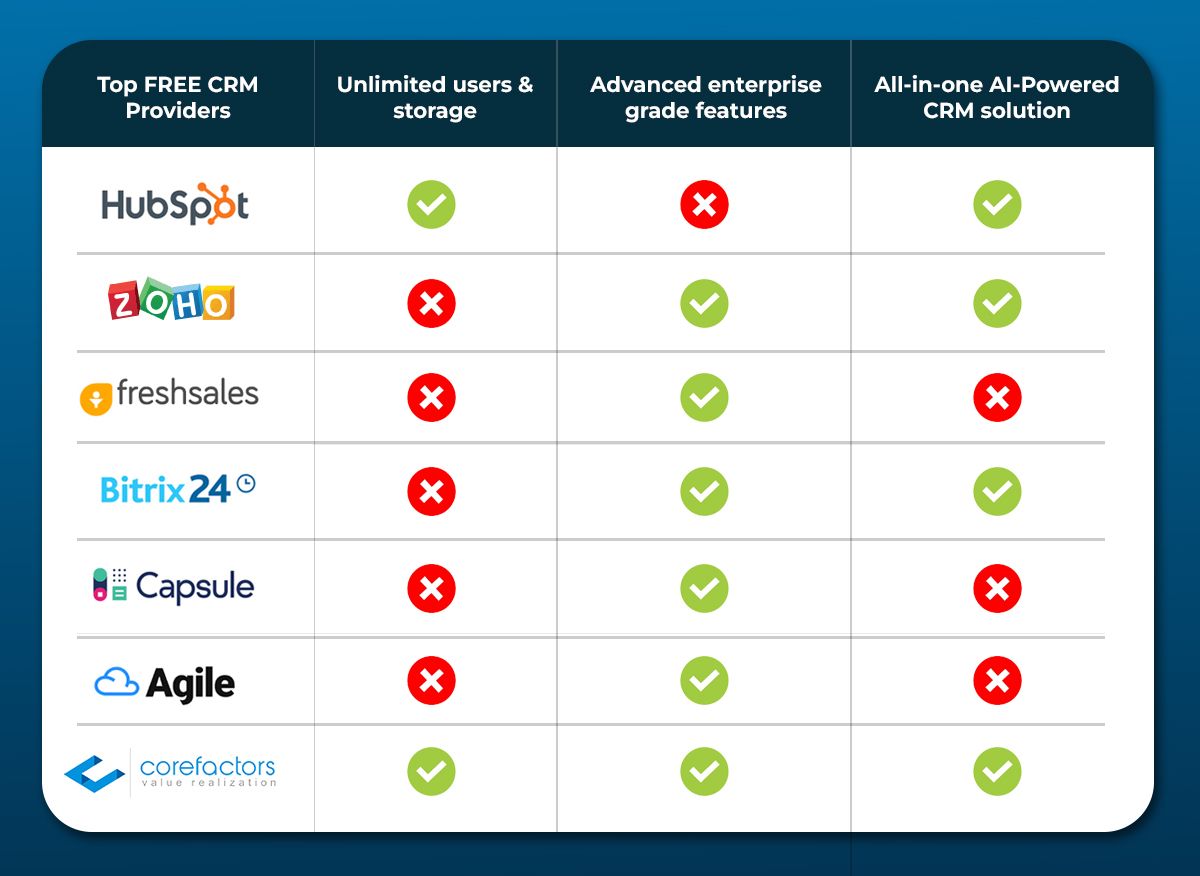
Recommendations for Businesses: Free CRM or Paid CRM?
The choice between free and paid CRM solutions depends on your business's unique needs, budget, and growth expectations. Here are some recommendations to help you make an informed decision:
1. Assess Your Requirements
Start by evaluating your business requirements. Consider factors such as the number of users, the complexity of your sales and marketing processes, and the need for customization.
2. Consider Scalability
If your business anticipates rapid growth, it's wise to choose a CRM system that can scale with your needs. Free plans may become limiting as your business expands.
3. Budget Constraints
If you're a small business or startup with limited funds, a free CRM plan can be a good starting point. Be aware of the limitations and expect potential upselling from the CRM vendor.
4. Long-term Strategy
Think about your long-term CRM strategy. If you foresee the need for advanced features, integrations, and scalability, investing in a paid CRM solution from the beginning might be more cost-effective in the long run.
5. Customization Needs
If your business requires extensive customization and control over your CRM system, open-source CRM solutions might be a better fit, even if they require more technical expertise.
6. Data Security and Compliance
Ensure that the CRM solution you choose complies with data security and privacy regulations relevant to your industry and location.
7. User Training and Support
Consider the availability of training resources and customer support. Paid CRM solutions often offer more comprehensive support than free options.
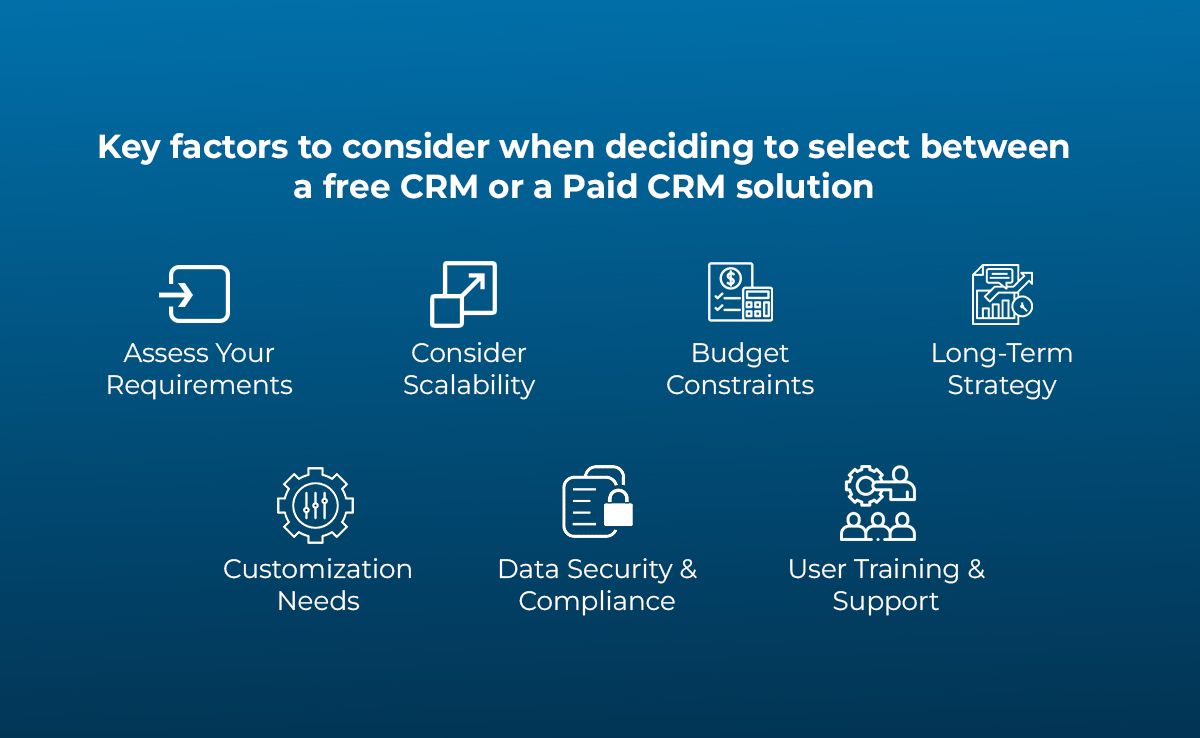
Final Words
Free CRM solutions can be a valuable asset for businesses, especially those with limited budgets or just starting out. However, it's crucial to understand the limitations that come with free plans and carefully assess whether they align with your business needs and long-term goals.
For businesses expecting significant growth and requiring advanced features, a paid CRM solution may ultimately provide a more scalable and cost-effective solution. Making the right choice between free and paid CRM can significantly impact your organization's efficiency, customer relationships, and overall success.








